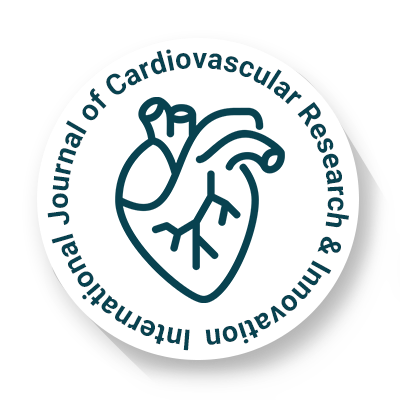
International Journal of Cardiovascular Research & Innovation
OPEN ACCESS

OPEN ACCESS
The endothelium, a thin layer of cells lining the inner walls of blood vessels, plays a pivotal role in vascular homeostasis. It regulates vascular tone, maintains blood fluidity, and controls the passage of molecules and immune cells. However, when the endothelium loses its functional integrity, a condition known as endothelial dysfunction arises. This pathological state is characterized by an imbalance between vasodilatory and vasoconstrictive substances, leading to impaired blood flow and heightened cardiovascular risk.
Endothelial dysfunction is a precursor to several cardiovascular diseases, including atherosclerosis, hypertension, and heart failure. The primary culprits behind this dysfunction include oxidative stress, chronic inflammation, and metabolic imbalances. Factors such as smoking, diabetes, obesity, and sedentary lifestyles exacerbate endothelial impairment by increasing the production of reactive oxygen species (ROS), reducing nitric oxide (NO) bioavailability, and triggering pro-inflammatory pathways. Without adequate NO, blood vessels lose their ability to relax efficiently, resulting in increased vascular resistance and arterial stiffness.
One of the earliest signs of endothelial dysfunction is reduced vasodilation in response to physiological stimuli. This impaired response sets the stage for plaque formation and vascular rigidity, making individuals more susceptible to ischemic events such as heart attacks and strokes. Additionally, endothelial dysfunction fosters thrombosis by promoting platelet aggregation and disrupting the natural anticoagulant properties of the endothelium. These mechanisms collectively contribute to the progression of cardiovascular diseases, often remaining asymptomatic until a major clinical event occurs.
Emerging research highlights the potential of lifestyle modifications and pharmacological interventions in mitigating endothelial dysfunction. Regular physical activity enhances endothelial health by stimulating NO production and improving vascular elasticity. A diet rich in antioxidants, such as fruits, vegetables, and omega-3 fatty acids, combats oxidative stress and supports endothelial repair mechanisms. Moreover, pharmacological agents like statins, ACE inhibitors, and beta-blockers have demonstrated efficacy in restoring endothelial function by reducing inflammation and oxidative damage.
Advancements in biomedical research continue to uncover novel therapeutic targets for endothelial dysfunction. Gene therapy, regenerative medicine, and nanotechnology-based approaches hold promise in repairing and rejuvenating endothelial cells. Biomarker-driven diagnostics are also gaining attention, enabling early detection and personalized treatment strategies for individuals at risk of cardiovascular diseases.
Understanding endothelial dysfunction is crucial for developing proactive cardiovascular healthcare strategies. As the underlying factor in numerous vascular disorders, addressing endothelial health can significantly reduce the burden of heart disease worldwide. Ongoing research and innovation in this field will pave the way for more effective interventions, ultimately improving cardiovascular outcomes and patient longevity. Journals like the International Journal of Cardiovascular Research & Innovation play a crucial role in disseminating cutting-edge research and fostering collaboration among experts dedicated to advancing cardiovascular health.